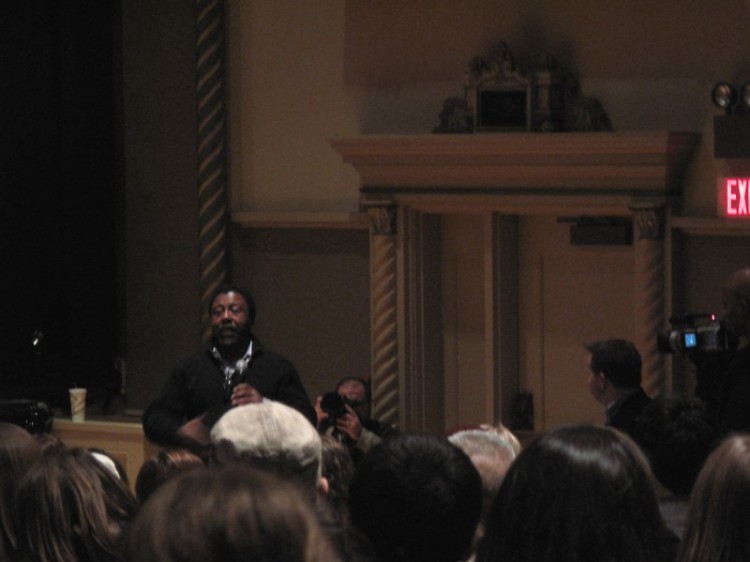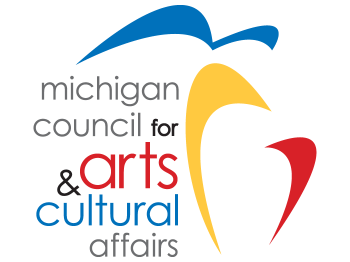Familiar faces from the local media scene, Uptown business owners and local politicians filed into Wealthy Theatre on Wednesday evening for Rapid Growth Media’s speaker series. Originally a panel, the event was restructured as a public forum to accommodate a discussion that has swept the business area: Is Uptown’s development revitalization, gentrification or something else?
“Events transpired on Dec. 25 that sort of changed the whole tone of the conversation. It became clear to us that there were more than one side to the story,” said Jeff Hill, Rapid Growth’s publisher. Hill was referring to vandalism that affected several Uptown businesses. “As the discussions became more heated ... we realized it would not be fair of us to present one side of the story as we traditionally do.”
The event was nearly canceled on its eve, but community activist Johannah Jelks called Hill and urged him onward.
“This was no longer our event, this was the community’s event,” Hill said. “This is not the last word on this issue or on this discussion.”
Hill then surveyed the audience by a show of hands. Roughly half the audience lived near the collection of businesses known as “Uptown,” and the majority self-identified as patrons of Uptown. There were over 20 business owners present from all over the city. Hill and co-facilitator Tommy Allen then set the tone for the discussion and rules of engagement. The goal of the one-and-a-half hour event was to discuss five questions:
- How do people perceive the culture in Uptown and its sub-neighborhoods?
- What assets and amenities entice people to live and work in Uptown?
- Why do businesses locate to this area and why do people patronize the area?
- How have sub-neighborhoods in Uptown collaborated?
- What are areas of Uptown neighborhoods that need improvement?
The responses to the first question revolved around historical context. Former East Hills Business Association president Rachel Lee, historical scholar Randal Jelks and community organizer Eddie Grover contextualized that revitalization was not only due to new businesses but the efforts of neighborhood activists seeking employment for area residents. At one point, Uptown, just like much of Grand Rapids, was a redlined area that banks refused to finance.
Community organizer Dotti Clune fleshed it out, explaining that Dave Robinson, a prominent African American from the area, jump-started development with a personal donation of $6,000.
“He understood that the neighborhood associations did not have the capacity to undertake a major economic development effort on Wealthy Street,” Clune said. “Wealthy Street was a border, and people were focused within their districts but not on their border.”
Owners of Spirit Dreams, Richard App Gallery, Foot Outfitters, Peninsula Trading, Art of the Table, The Winchester and employees from various locally focused nonprofits spoke up. Old business owners reflected on Uptown’s different phases and the fierce pride they feel while new business owners expressed surprise at a past they did not experience. Both felt that Grand Rapidians whole-heartedly embrace their businesses.
“This is such a love fest,” quipped Chitra Gopalakrishnan, a member of the audience. Armed with the mic, Brick Road Pizza Company employee Marlee Cook-Parrott voiced the same observation, noting that the room seemed to be patting itself on the back.
Meanwhile, other prominent community organizers such as East Hills Council of Neighbors' Kathryn "K.C." Caliendo pointed out that behind every Uptown success was hundreds of block club meetings, potlucks and dumpster clean-ups, and each victory was hard-won.
A few residents in Baxter and Eastown shared their appreciation for those efforts and the benefits their children reaped in growing up in a diverse area.
“More residents from the community, more youth could have been here,” said Sharon Grover after the event. Husband Eddie Grover has lived near Wealthy Theatre for 42 years and suggested getting in touch with community organizations that serve the youth to further alert potential participants.
“When we put those titles on things or give them their little names, that disassociates the people. Uptown. That's a business [district] thriving, but it's not the people.” said Grover, who runs S.T.R.O.NG. (Systematically Training & Revitalizing Our New Generation), a martial arts mentorship program for youth. “If you say the Wealthy Street community or the Baxter community, now you're talking about the people, and that makes a big difference.”
The last half hour gave rise to the word “gentrification.” Participants had denounced the Dec. 25 vandals as cowards several times, but some also acknowledged that the open forum structure might not be enough to make all stakeholders in the Uptown area feel comfortable in speaking up.
“For young people of color, if you are new and you are not familiar, and you are not the majority - that is a big a step - your first impression is your last impression,” said Johannah Jelks. Jelks indicated that she has had a good impression of the area but said she cannot speak for everyone.
“While I love going to The Winchester, and The Meanwhile, there are people who don’t feel comfortable,” said county commissioner Jim Talen. “I just want to implore all of us to be aware, to listen, to try to understand, to try to hear. We’ve been struggling with these issues as long as people have been around. We’re not going to find the answers tonight.”
Additional reporting by George Wietor
The Rapidian, a program of the 501(c)3 nonprofit Community Media Center, relies on the community’s support to help cover the cost of training reporters and publishing content.
We need your help.
If each of our readers and content creators who values this community platform help support its creation and maintenance, The Rapidian can continue to educate and facilitate a conversation around issues for years to come.
Please support The Rapidian and make a contribution today.


Comments
Well done.
Appreciate the wrap up of the event. Wondering what some of the next steps will be with this important issue.
Wondering whether there was any in-depth analysis regarding gentrification (e.g. comparison of communities where gentrification has happened, and the difference between those locations and the Wealthy District). From reading this article, it seemed like it took a long time to really drill down into the heart of the issue during the event, and then there wasn't much drilling (if there is anything to drill). I certainly don't condone how this issue was brought to the forefront. However, the question of gentrication is certainly legit. I wish I could have been there (busy having a baby). I, too, would like to hear next steps.
Jeremy,
A 90 minute open forum, this evolved (in my observation) as more of conversation starter. With over 150 folks there, seems it would be hard to do in-depth anything. More an experiement in inviting folks together and building trust that conversation can happen. It also brought in good historical context. The event also generated quite a list of people who want to host, attend and engage in smaller conversation groups going forward. I look forward to those.
As Laurie said, it's hard to dive deep into an analytical look at housing and rent prices, racial makeup, and other factors that might be leading to gentrificaiton in a setting like that without it seeming academic and wonkish, in my opinion. I always think of large scale forums as awareness builders, and small scale meetings and task forces as the place to flesh out action items (if need be). Thanks for the feedback!
Thanks - looking forward to joining the conversation in person at some point!
the most important part of what i said while armed with the mic was not that i felt people were patting themselves on the back.
it was noticing that no one speaking up was someone who felt uncomfortable in uptown businesses. we were having a forum in a business that is in the neighborhood in question, so naturally the conversation that was brewing was between dozens of like minded individuals. and if those people were in attendance, the celebratory, yet at times defensive tone was not empowering them to speak up.
last night was beautiful. in so many ways. i learned a lot historically, and found new ways to get involved. however, in both internet forums as well as in real life last night, the tone is overwhelmingly defensive. rightfully so, but we need to start actually talking about the dirt now. and last night was just skimming the surface.
jim talon and laurie brought up two amazing points that have been simmering in my brain. as the folks in this neighborhood who are active or attended last nights forum it is now our RESPONSIBILITY to take action. that could be as small as introducing yourself to someone new. walking into a business you've ever been to before. the cliche yet important : get to know your neighbors.
i echo what jeff says above regarding the purpose of the forum being an awareness builder. in fact it made me feel a little more positive about my experience last night. i can't help but still be concerned with many business owner's complete dismissal of the events of dec 25th or extreme defense.
my dad always says : if you really piss someone off or hurt their feelings it doesn't matter if it's actually your fault or not. they are sad. something you did or said made them sad. and now you have to work really hard to understand why they are feeling that way.
"brick thrower" became a joke. i think i even stabbed at it. but it's real. a group of people found a way to vandalize 6 businesses, get away with it, and get 150 people into one room to talk about it. maybe that was backwards of their intentions, because it was obvious that it really just brought a lot of activists together in a room to feed off of each other in a positive and safe way. pat each other on the back if you will. (which is awesome. i wish someone would pat my back more. really)
but in reality. there are folks in uptown who aren't getting a pat on the back. and if we ban together and get so strong, we might still be excluding people. it's important to recognize that not everyone IS on the same page. everyone in that room was. but what about the people who didn't get the memo that we were meeting? are most of the neighbors in uptown fans of rapid growth on facebook? i doubt it.
questions arose in my mind : what neighbors aren't here? why not? which ones are? was this event only on facebook? who invited the people here? did someone walk into all the shops and invite everyone over?
i don't know those answers. all i know is i have a dance performance in two hours. and i need to eat. sorry this was long winded. go team.
I appreciate your comments and observations. And I loved your comments. And your dad is a smart guy!
I do want to point out that in addition to FB, Rapidian, and other online platforms, some folks made and hand distributed/posted flyers, specifically to try "get the word out" beyond the Internet.
I look forward to what can come out of small group conversations.
awesome. you know i love me some flyers. next time an event like this happens i would love to be part of the group of people involved in the "non-internet" side of things.